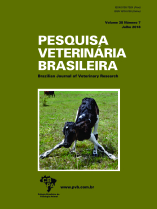 |
|
|
|
Year 2018 - Volume 38, Number 7
|

|
Adherence to and invasion of HeLa cells by Campylobacter spp. strains isolated from animals, 38(7):1293-1299
|
ABSTRACT.- Morais-Rios P.A.G., Alves T.M., Dorneles E.M.S., Stynen A.P.R., Cottorello A.C.P., Lauria-Filgueiras A.L. & Lage A.P. 2018. Adherence to and invasion of HeLa cells by Campylobacter spp. strains isolated from animals. [Adesão e invasão de células HeLa por amostras de Campylobacter spp. isoladas de animais.] Pesquisa Veterinária Brasileira 38(7):1293-1299. Laboratório de Bacteriologia Aplicada, Departamento de Medicina Veterinária Preventiva, Escola de Veterinária, Universidade Federal de Minas Gerais, Av. Antônio Carlos 6627, Cx. Postal 567, Belo Horizonte, MG 31270-901, Brazil. E-mail: alage@vet.ufmg.br
The objective of this study was to evaluate the adherence to and invasion of HeLa cells by Campylobacter spp. strains (total n=63) isolated from chickens (n=4), dogs (n=4), non-human primates (n=16), pigs (n=9), calf feces (n=18), and bovine genital tracts (n=12). Thirty-two strains adhered to and 13 invaded HeLa cells. Invasive strains included 1 of 4 dog isolates, 4 of 16 non-human primate isolates (2 C. jejuni and 2 C. coli), 1 of 9 C. coli strains isolated from pigs, and 7 of 18 C. fetus subsp. fetus isolated from calf feces. Only 25% of chicken and dog isolates and 23% of pig isolates were able to adhere to HeLa cells, a property of 65% of strains obtained from calf feces and 83% of bovine genital tract-isolated strains. The adherent phenotype was observed in 5 of 19, 6 of 15, and 21 of 29 strains of C. jejuni, C. coli, and C. fetus subsp. fetus, respectively, whereas 3 of 19, 3 of 15, and 7 of 29 strains were additionally able to invade HeLa cells, respectively. C. jejuni, C. coli, and C. fetus subsp. fetus strains isolated from animal feces are able to adhere and invade HeLa cells, whereas C. fetus subsp. fetus strains isolated from the bovine genital tract were not invasive in HeLa cells. The present study showed that C. jejuni isolated from primates and dogs, C. coli isolated from non-human primates and pigs, and C. fetus subsp. fetus isolated from calf feces have the ability to adhere to and to invade HeLa cells. Moreover, the lack of invasive ability by C. fetus subsp. fetus strains isolated from the bovine genital tract could be important in the pathogenesis of the genital tract diseases caused by this bacterium. |
| |
|
|
| |
|
 |